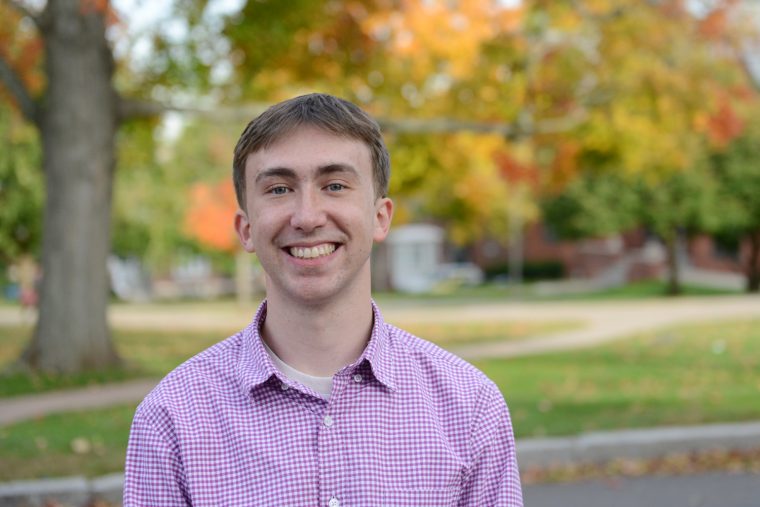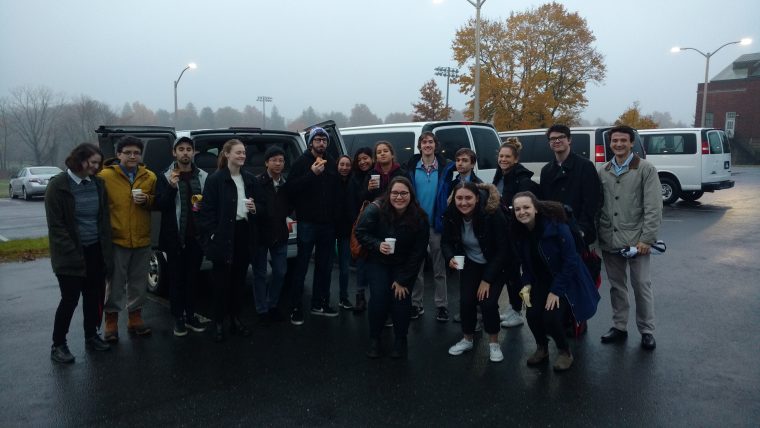Associate Professor of Government Logan Dancey’s research and teaching interests include the United States Congress, campaigns and elections, and public opinion. We spoke to him about the government’s response to the coronavirus pandemic. As a scholar of legislative decision-making, can you describe how the workings of the United States Congress look different during a time of crisis? It’s still early, but the government’s response to the coronavirus pandemic shows that even this gridlocked and polarized Congress—which doesn’t seem to accomplish much in normal times—is still fairly quick to respond to crises. We’ve seen large bipartisan majorities agree on fairly large-scale…
Students in Assistant Professor of Government Logan Dancey’s GOVT 232 Campaigns and Elections course got a real-world lesson in the subject matter this Election Day. On Nov. 6, the students stood out in the rain to field an exit poll—a survey of voters as they’re leaving their polling locations—in Connecticut’s Fifth Congressional District. The students conducted the surveys at nine different polling places spread out across six different towns in the district. In order to generate a diverse sample that reflected the demographics of the congressional district, the precincts were intentionally selected to provide a balance of more Republican-leaning, Democratic-leaning, and…
Logan Dancey, assistant professor of government, and Jasmine Masand ‘15 are the co-authors of "Race and Representation on Twitter: Members of Congress’ Responses to the Deaths of Michael Brown and Eric Garner," published in Politics, Groups, and Identities in July 2017. This paper investigates the public responses of members of Congress to the deaths of Michael Brown and Eric Garner and the subsequent protests and grand jury decisions. To do so, the authors examined members’ engagement with the issue on Twitter, which became a platform for public protest with such hashtags as #BlackLivesMatter and #ICantBreathe. "We find that a member’s race is a…
The 74th annual Midwest Political Science Association (MPSA) conference in Chicago April 7-10 was attended by several Wesleyan faculty members, students and recent alumni. The conference, held every April, is one of the largest political science conferences with more than 5,000 presenters from throughout the United States and around the world. It is traditionally held in Chicago's historic Palmer House Hilton. Assistant Professor of Government Erika Franklin Fowler, Assistant Professor of Government Logan Dancey, and Assistant Professor of Government Yamil Velez all presented research at the conference. They were accompanied by Joli Holmes '17, John Murchison '16, Grace Wong '18,…
Logan Dancey, assistant professor of government, is the co-author of "Heuristics Behaving Badly: Party Cues and Voter Knowledge," published in American Journal of Political Science 57 No. 2, 312-325, April 2013. Erika Franklin Fowler, assistant professor of government, is the co-author of "Political and News Media Factors Shaping Public Awareness of the HPV Vaccine," published in Women's Health Issues 23 No. 3, e143-e151, 2013. Giulio Gallarotti, professor of government, professor of environmental studies, tutor in the College of Social Studies, is the author of "The Enduring Importance of Hobbes in the Study of IR," published in e-International Relations, Jan. 10, 2013. Elvin Lim, associate professor of…
On Nov. 11, The Hartford Courant published an op-ed by Assistant Professor of Government Logan Dancey about Republican Linda McMahon's second unsuccessful bid for Connecticut's U.S. Senate Seat, despite spending more than $40 million in her campaign against Democrat Chris Murphy. Dancey writes that McMahon’s loss is reflective of a larger, nationwide decline in split-ticket voting. That is, voters now are much more loyal to one party, and less likely to choose candidates for President and Congress that belong to different political parties.
Assistant Professor of Government Logan Dancey started teaching at Wesleyan this semester—the perfect time, he says, to be teaching a course on Campaigns and Elections. “The unfolding presidential and congressional elections continually give us new events to think about as we read and discuss broader theories about the importance and meaning of campaigns and elections,” Dancey says. And though Congress has mostly ground to a halt this election season—meaning a dearth of current events to discuss in his Congressional Policymaking class—the increasing polarization in Congress has led to many interesting and important discussions in that course nevertheless. Dancey describes the…



